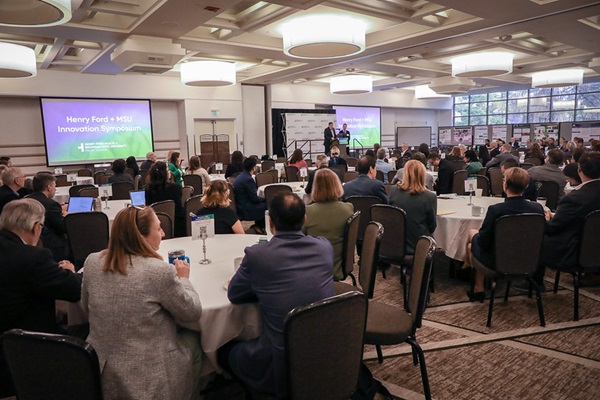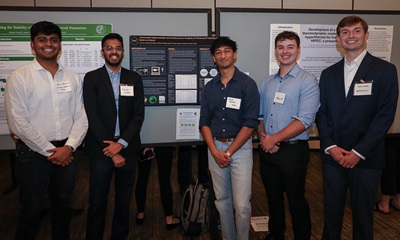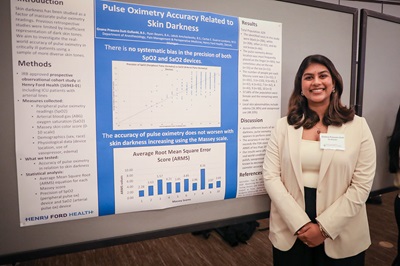Innovation Symposium Elevates Strategic Collaboration

On April 23, the inaugural Henry Ford + MSU Innovation Symposium brought together nearly 250 researchers, faculty, and staff from Henry Ford Health and Michigan State University.
Held at the East Lansing Kellogg Hotel and Conference Center, this Henry Ford Health + Michigan State University Health Sciences symposium encouraged innovative collaboration within the science communities at Henry Ford and MSU.
“People are starting to recognize the real potential of when a huge health system comes together with an amazing university,” said Scott Dulchavsky, M.D., Ph.D., the Henry Ford + MSU Innovation Committee co-chair and Henry Ford Innovation Institute CEO. “Now we need to take this from the conceptual opportunity to reality and this symposium is one step in achieving that goal.”

During the symposium, the audience had the opportunity to hear from key leaders at Henry Ford and MSU on The Future of Health: A Call to Action 2030. MSU President Kevin Guskiewicz, Ph.D., spoke on the MSU mission of One Team, One Health and how the partnership is unleashing synergy by multiplying and scaling the strengths of both Henry Ford and MSU.
Further emphasizing that message of strength in collaboration was Steven Kalkanis, M.D., inaugural Henry Ford + MSU president and current board member, and Henry Ford Medical Group CEO and Henry Ford Hospital CEO. Kalkanis elaborated on how both institutions are exploring innovative approaches to tackle the pressing challenges in health care.
“This symposium has been a great opportunity for people at Henry Ford and MSU to learn about each other's work,” said Paul Browne, former Henry Ford Health chief information office and now Emerging Technologies senior executive advisor.
Browne was one of the opening speakers for the symposium and presented on the Bioconvergence Revolution: Engineering Biology from Lab to Clinic. Bioconvergence is an industry segment within health care and research in life science that emphasizes the synergy between engineering/technology and computerized systems.
Browne hopes that symposium attendees realize that the power of collaboration is “...so much stronger and greater than any of us can do on our own.”

Expanding on this spirit of collaboration are a range of MSU capstone projects developed in partnership with Henry Ford. During the 2025 spring semester, Dirk Colbry, Ph.D., MSU College of Natural Science Department of Computational Mathematics, Science and Engineering (CMSE) director of user support, oversaw 15 MSU College of Natural Science capstone projects in which four of the projects collaborated with Henry Ford.
One of the featured projects, developed by four seniors from MSU College of Natural Science and one senior from the College of Engineering, was presented during the symposium as a research poster titled Automated Segmentation and Performance Analysis of Ultrasound Training Procedures RUSH & POCUS.
"The students get practice presenting their work to a professional audience, " said Colbry when asked about the benefits undergraduate students receive from presenting their research. "This is vitally important for them to learn how to communicate 'in the real world.'"
Throughout the room, scientists displayed and discussed with other symposium attendees their research posters. Research topics ranged from using an insect-based sensor to detect endometriosis to using AI to improve patient-physician communication.

With positive responses like Gullanki’s, the partnership hopes to host more events that will elevate the strategic collaboration between Henry Ford and MSU.
Photos from the inaugural Henry Ford + MSU Innovation Symposium can be viewed here.
